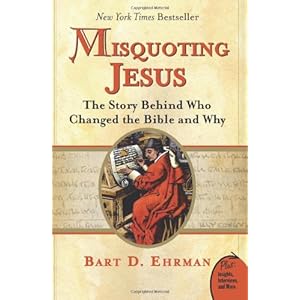 Misquoting Jesus: The story behind who changed the bible and why
Misquoting Jesus: The story behind who changed the bible and whyBart D. Ehrman
In our age of first ubiquitous printed material and latterly instant text-based communications, we tend to assume that a text is fixed and immutable, that we can know what somebody said, and we can enquire as to whether they stand by it. Writing is a big part of my professional life, and any writer knows the frustration and surprise which comes from having someone else edit one's words - even if the editing leads to an over-all improvement. Yet I also know that for all the ease of transmission, many of the papers I work with appear in a number of versions, conference and journal variants, as well as invited book chapters and technical reports and all the rest. One just tends to assume that similar papers say similar things - even if one goes to great lengths to eliminate flaws in later versions of one's own work.
We easily forget that it was not always thus: that there was a time when all manuscripts were copies; when variants arose and got copied, and the variant readings became dominant. The variations in copies of my own work are as nothing compared to the variations in the many manuscripts we have of the new testament.
This book is a systematic account of the reason we have so many manuscripts, and how they differ, and what the church has done about it. Here, Ehrman tells the story of how variations came about (very largely through copying by amateur scribes in the earliest years of Christainity), why they came about (through mistakes, and through well-meaning attempts to improve the text), and where they are to be found in the New Testament (in changes great and small).
The account is very accessible - bordering on the patronizing at times perhaps: I get the impression that this is a popularized version of some of his more scholarly writing. Surely most of us have noticed the footnotes that tell us to beware the last few verses of Mark's gospel, or the account of the woman taken in adultery. Perhaps, too, we have noticed the occasional footnotes in, say, the NIV, which give variant readings for all manner of passages. Ehrman seems to assume we have ignored all of those - but then goes on to paint a fulsome picture of the reasons for and significance of a number of those alternatives, so I can forgive him for treating me like an incurious naive reader. Although he dwells on a handful of examples (no doubt the more juicy ones), he observes that the collection of manuscripts known to us displays literally thousands of variant readings. The methods for trying to guess what the original may have been are indeed like a detective story.
The book is topped and tailed with accounts of Ehrman's own faith - or, rather, how he began biblical studies with a strong evangelical notion of inerrancy as a 'born again Christian' but arrived at a point of "seeing the bible as a very human book, with very human points of view". As I understand it, he would no longer describe himself as a Christian at all. The introduction surveys the steps in this process; the conclusion looks at the philosophy and hermeneutics which flow from the scholarship surveyed in the book. What sense is there in believing in inerrancy of the original text if that text is now lost to us? Worse, why would the Almighty go the trouble of providing inerrant scriptures and then not preserve them for our reading?
The standard evangelical response to the textual variations is to say that none of them touch upon important matters of doctrine. Ehrman challenges this, observing that some significant, well-known stories are in doubt. And if you set great store by that "All scripture is God-breathed and is useful ..." line, well, how can you decide which are the unimportant bits?
I guess - though I haven't really delved into it - that as a former Evangelical who became an ex-Christian largely through studying the bible, Ehrman is something of a bogey-man in your average bible college. If we are to take scholarship seriously and receive the bible without a naive simplicity (which it doesn't deserve), then voices like his must be listened to with care: I find much of what he says very persuasive. I shall read more of what he has to say.
No comments:
Post a Comment